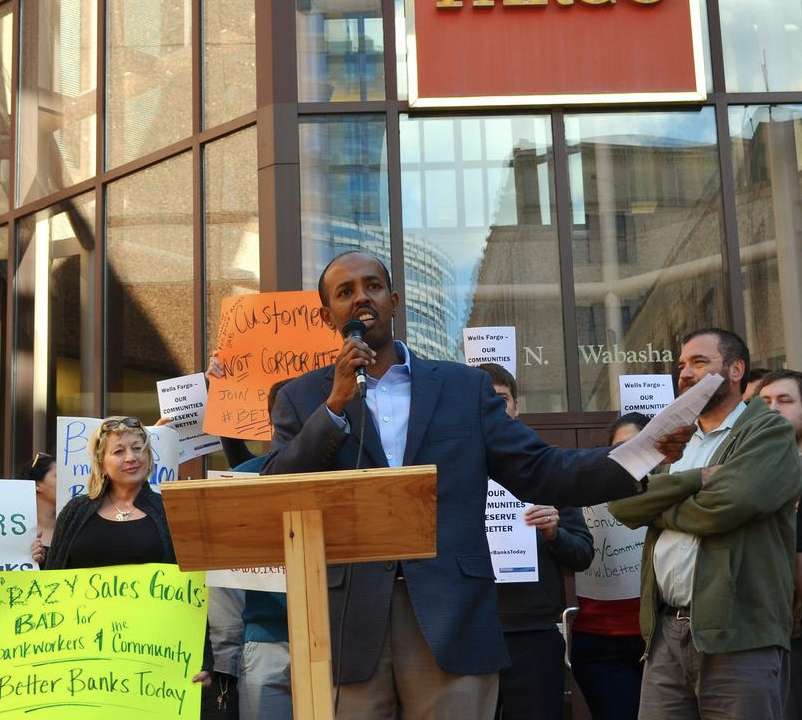In March 2020, one hundred thirteen Beneficial State Bank employees joined my union, the Communications Workers of America (CWA), becoming the first U.S. bank workers in decades to win union rights. The bankers, loan processors, underwriters, file clerks, and custodial staff at this bank now have a seat at the table to bargain and negotiate over their working conditions. This is a tremendous victory, the significance of which goes far beyond these 113 workers.
The finance industry is plagued with systemic issues of discrimination, low-wages, extreme sales goals, and whistleblower retaliation. It also has the country’s lowest percentage of union representation. These conditions not only affect an estimated 1.27 million frontline workers in the United States, they affect all of us as the finance industry touches nearly every aspect of our lives.
Frontline bank workers regularly have to meet extreme sales goals and metrics, and this means they often have to push unnecessary, and sometimes even predatory, products on their consumers. A teller may have to make a certain number of referrals to personal bankers, a banker’s metrics could be how many loans they must create, a customer service representative has to sell credit cards, a collector brings in a certain amount of debt each hour. All of this means they do not have the time, resources, or ability to explain products thoroughly and help a customer really assess what fits their needs. Not meeting these metrics could mean discipline or termination, or not earning enough incentives to make rent that month.
Furthermore, in one of the most profitable industries in the world, these banks are paying frontline employees very little. Last year, profits at the nation’s largest banks soared to record highs amid a $38 billion tax handout from the Trump Administration, while the median annual wage for bank tellers nationally languished at $29,450 according to the most recent data available. Instead of investing in their workforces, banks are ramping up layoffs and offshoring to cut corners. This precariousness and lack of job security means that frontline bank workers are much less likely to blow the whistle or speak up when they see wrong doing within the banks.
In other countries, union membership is the norm – over 3 million bank workers have union representation globally. In 2014, the Brazilian bank workers union came to us because the United States was bringing down standards globally in this industry. They asked if they could help us do something about it. We formed a community-labor coalition to start organizing frontline workers industry-wide. The impact was more than we ever imagined.
Turns out organizing both sides of the counter — workers and our communities — meant more power to make change on both fronts. By exposing that a third of bank tellers were on some sort of public assistance in the most profitable industry in the world, and organizing around the issue with workers and the Fight for $15, we were able to raise the minimum wage at all the major banks to at least $15 an hour, and in some cases even more.
We also sought to tackle the extreme sales goals in the industry that nearly every bank worker was complaining about. Workers started a petition to end the use of these extreme goals at Wells Fargo and highlighted how it was affecting customers. Frontline workers were feeling so much pressure it was leading them to open accounts that were never used. We delivered it with community members at branches across the country. We worked with the National Employment Law Project to interview workers and release a report on the widespread use of the practice and the ill effects on customers and communities. In June of 2016, we held a briefing on Capitol Hill and met with elected officials, regulators, and House and Senate committee chairs. The Consumer Finance Protection Bureau issued the largest fine to date in September 2016, and the elected officials we met with were the ones calling for hearings on the matter. They were texting bank workers from the Committee for Better Banks to verify what the CEO was testifying to. Ultimately, the CEO was forced to resign, 4,500 workers who were fired were offered their jobs back, and Wells Fargo announced they were eliminating sales goals. For years, bank workers had blown the whistle on Wells Fargo, but it was only when they came together in an organized way, with labor and community, that they were able to stop these metrics. Now, because we do not have these wins locked into a collective bargaining agreement, we are seeing sales goals creep back into the workplace.
The organizing win at Beneficial State Bank represents the beginning of the next phase of this work: collective bargaining rights for bank workers. With these rights, bank workers can improve their own working conditions, and the lives of the communities they serve. If there is anything we have learned from our six years of industry-wide organizing, it is that we have so much more power when we fight for the common good. We bring the weight of the community with us, and the power of public pressure, and we win–all of us win. This has never been more salient than in this moment. As we confront the COVID 19 crisis, financial consumers need advocates that are looking out for all of us, not just the banks’ bottom line. While workers and our communities struggle to survive, banks will almost certainly line up once again for government support, despite massive stock buyback programs last June. Bank workers should be a key voice in this conversation and the first line of defense.
With collective bargaining rights bank workers could demand not only a living wage, and a voice in their sales goals and metrics, they could take it a step farther to demand an end to forced arbitration and non-disclosure agreements for workers and consumers. With job security and just cause provisions, they could feel real comfort in blowing the whistle when they see wrongdoing and predatory practices. They could be the customer service and financial advisors they ultimately want to be. And they could regulate the banks for all of us, from below – especially now, when we need them the most.


